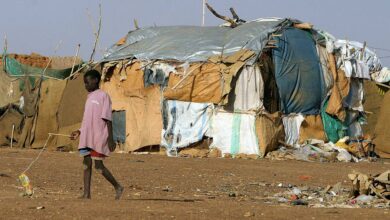The trauma heaped upon Ukraine’s children, mothers

By Isaac J. Martín
Lviv, Ukraine, Mar 10 (EFE).- Ukraine’s children are bearing the brunt of Russia’s invasion, which in the space of just over two weeks has forced over a million minors to leave the country in search of refuge.
Ukrainian mothers are left with the task of confronting trauma while trying to limit its effect on their children.
At Lviv train station in western Ukraine, Svetlana cradles her 18-month-old son Olexiy as she waits for the next train to take her out of the country.
“I try to stay calm for my son, to not transmit my fear to him. When there was bombing, I told him it was bad weather and thunder,” the 38-year-old tells Efe from a special waiting room at the station for women with children under 5.
Lviv has become a major transit point for Ukrainains fleeing the conflict toward Poland, Romania and Hungary.
According to Save the Children, minors account for half of the over two million people who have fled Ukraine since the end of February in what has become the fast-growing exodus of refugees since World War II.
Svetlana and her son are from Kharkiv, Ukraine’s second-largest city, which has been devastated by Russian bombardment.
The mother tells Efe that she and her son spent their last few days in the city hiding in the corridor and the bathroom until she decided to leave for Lviv.
“I hope that this will not have repercussions on my son and his mental health, but I’ve already noticed that my son has learned to say ‘boom boom’.”
Outside the station, seven-year-old Sasha plays with her stuffed bear, Misha, next to her parents and grandmother. The family escaped hostilities on the outskirts of the capital Kyiv, where bombing blew the windows out of their home of 20 years.
“My house was almost falling down, me and Misha were not scared because we managed to escape, we hid in the bath,” Sasha says.
Child psychologist Sergiy Kryglyk, 58, volunteers at the Lviv station and is the first person mothers and children see when they arrive.
“Children don’t understand why they are traveling with their mother but without their father, they don’t understand the situation they are in,” he tells Efe, adding that the children he meets have fear in their eyes, but not as much as their mothers.
“You have to inform the mothers calmly, saying everything here is fine, there are no bombs and there is peace,” Kruglyk adds, in reference to Lviv being one of the safer regions of Ukraine at present.
Some of the mothers at the Lviv train station have come from Mariupol, in southeastern Ukraine, where on Wednesday Russian forces bombed a children’s hospital, killing at least three people, including two children, according to Kyiv authorities. EFE
ijm-ok/jt/ks





